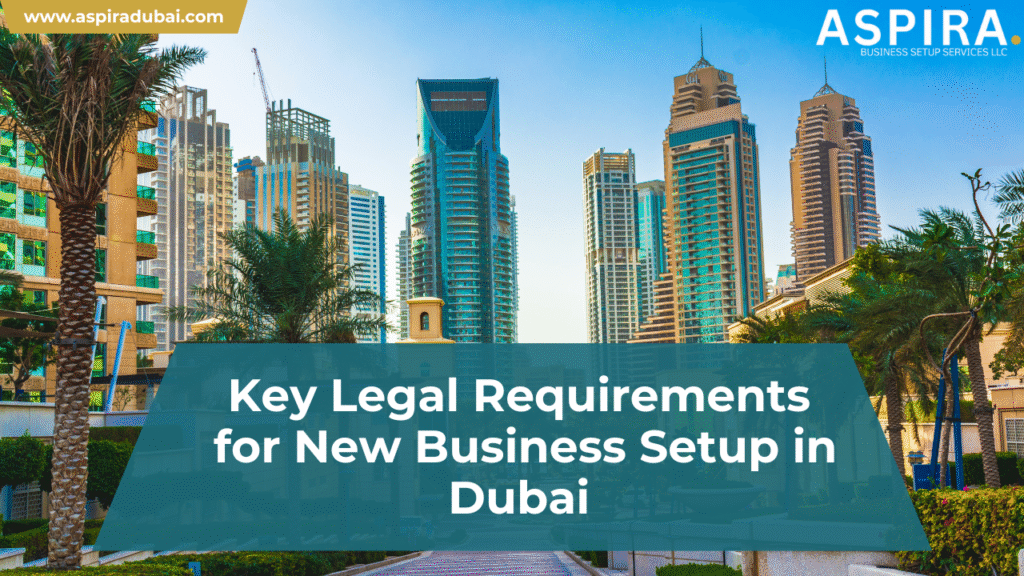Starting a new business in Dubai is one of the most rewarding ventures for entrepreneurs. The city has transformed into a global hub for innovation, trade, and entrepreneurship, attracting investors from every corner of the world. But before you can open your doors and begin trading, you need to fully understand the legal requirements for business setup in Dubai.
Every step of the process—choosing the right structure, registering your trade name, applying for a license, securing visas, opening a corporate bank account, and complying with tax laws—must align with UAE regulations. If you miss even one step or fail to meet compliance requirements, it could result in delays, penalties, or even the suspension of your business license.
In this comprehensive guide, we’ll cover the key legal requirements you need to know when setting up a business in Dubai, giving you the clarity to make informed decisions and avoid costly mistakes.
Choosing the Right Business Structure in Dubai
The foundation of your company formation journey starts with selecting the correct business structure in Dubai. Your choice will determine ownership rights, taxation, visa eligibility, and your ability to trade within or outside the UAE.
Mainland Company
A Mainland LLC (Limited Liability Company) is the most common setup option for businesses that want the flexibility to operate across the UAE and beyond. These companies are licensed by the Dubai Department of Economy and Tourism (DET/DED) and require compliance with UAE Commercial Companies Law. A mainland company can take on government contracts, work with private companies, and open branches anywhere in the UAE.
Free Zone Company
Free Zones are designed to attract foreign investors by offering 100% ownership, tax exemptions, and simplified regulations. Popular free zones include DMCC, IFZA, JAFZA, RAKEZ, and Shams. Each free zone has its own authority, licensing rules, and industry focus, making them ideal for e-commerce, tech, logistics, or professional services businesses.
Offshore Company
An Offshore company in Dubai is primarily used for international trade, holding assets, or wealth management. Offshore businesses cannot trade within the UAE but benefit from tax efficiency, confidentiality, and simplified compliance.
Why It Matters
Choosing the wrong structure could restrict your ability to operate, impact your visa eligibility, and increase your compliance burden. Consulting with experienced business setup advisors in Dubai ensures your company is structured in a way that supports growth while staying legally compliant.
Registering Your Business Name with DED or Free Zone Authority
Your company’s identity begins with a trade name. This is not just a brand decision; it’s a legal requirement in Dubai.
The Dubai Department of Economy and Tourism (DED) for mainland companies or the respective free zone authority for free zone companies must approve your trade name. The guidelines are strict:
- The name must reflect the nature of your business.
- No offensive, blasphemous, or political terms are allowed.
- Personal names can be used but must match the shareholder’s passport.
- Abbreviations are often restricted.
Once approved, you’ll receive a Trade Name Certificate, which is essential for the next steps in your licensing process.
Key Point
A trade name is one of the first official documents you’ll secure. Without it, you cannot apply for a business license. Choosing a relevant, professional, and compliant trade name sets the tone for your company’s credibility.
Obtaining the Correct Trade License in Dubai
The trade license is at the heart of every business operation in Dubai. Without it, your company cannot legally function.
Types of Trade Licenses in Dubai
- Commercial License – For trading and commercial activities.
- Professional License – For service providers, consultants, or professionals.
- Industrial License – For manufacturing and industrial operations.
- Tourism License – For travel and tourism-related services.
The issuing authority depends on your structure: DED issues licenses for mainland companies, while each free zone issues its own license for businesses under its jurisdiction.
Traffic Tip
“Trade license in Dubai” is one of the highest-searched terms online. Including this keyword naturally across your content can significantly increase visibility.
Understanding Visa and Immigration Requirements
Dubai offers a business-friendly environment, but immigration and visa rules are strictly regulated.
- Investor/Partner Visa – Required for shareholders or owners.
- Employment Visa – For staff sponsored under the company.
- Dependent Visa – For family members of investors and employees.
Every visa application involves medical fitness tests, Emirates ID registration, and residence permits. Visa quotas depend on your office space and license type. For example, a company operating from a flexi-desk in a free zone may be eligible for 2–3 visas, while a larger mainland office can support dozens.
Pro Insight
Free zones often bundle visa packages into their company setup offers, while mainland companies may require separate approvals depending on business activity and office size.
Corporate Bank Account Opening Regulations
Opening a corporate bank account in Dubai is a vital step for running your business legally. However, UAE banks follow strict compliance policies to prevent money laundering and ensure financial transparency.
Requirements include:
- Trade license copy.
- Shareholder passports and residency visas.
- Company Memorandum of Association (MOA).
- Business plan and proof of operations.
- Office tenancy contract.
Most banks also conduct a Know Your Customer (KYC) review and may request additional supporting documents depending on the nature of your business.
Important Note
Delays often occur because entrepreneurs underestimate the documentation required. Incomplete files or lack of clarity about business activities can result in account rejection. Working with professional PRO services in Dubai streamlines this process.
Taxation and VAT Registration in Dubai
Dubai is known for its tax-friendly environment, but recent legal reforms mean every entrepreneur must stay informed.
Corporate Tax
In June 2023, the UAE introduced a 9% corporate tax on business profits above AED 375,000. Companies are now legally required to register with the Federal Tax Authority (FTA) and maintain proper financial records.
Value Added Tax (VAT)
Introduced in 2018, VAT in the UAE is set at 5%. Any company generating taxable supplies above AED 375,000 must register for VAT, file returns, and pay dues quarterly.
Why It’s Critical
Failure to comply with tax regulations can result in heavy fines, license suspensions, and reputational damage. Maintaining accurate accounting systems and seeking support from tax consultants in Dubai ensures full compliance.
Compliance with Labour Laws and Employment Contracts
Another major legal requirement involves labour compliance.
- All employee contracts must be registered with the Ministry of Human Resources and Emiratisation (MOHRE).
- Companies must use the Wage Protection System (WPS) to pay salaries on time.
- End-of-service benefits, working hours, and leave entitlements must align with UAE Labour Law.
Employer’s Responsibility
Respecting employment regulations is not only a legal obligation but also builds a positive reputation for your company. Businesses found violating labour laws may face fines, restrictions, or even suspension of operations.
Industry-Specific Approvals and Permits
Not every license covers all business activities. Some industries in Dubai require special approvals from regulatory authorities in addition to your trade license.
- KHDA (Knowledge and Human Development Authority): For schools, training centres, and educational consultancies.
- DHA/MOH (Dubai Health Authority/Ministry of Health): For clinics, hospitals, and healthcare businesses.
- Dubai Municipality: For food trading, restaurants, and catering businesses.
- Telecommunications and Digital Authority (TDRA): For IT and telecom activities.
Why It Matters
Skipping special approvals can result in your business being shut down, along with heavy penalties. Always verify if your chosen activity requires external approvals before starting operations.
Maintaining Ongoing Legal Compliance in Dubai
Business setup is only the beginning. Ongoing legal compliance in Dubai ensures your company stays operational without disruption. Key obligations include:
- License renewal – Annually, with penalties for late renewals.
- Accounting audits – Required for mainland and certain free zone companies.
- Visa renewals – Must be managed before expiry.
- Economic Substance Regulations (ESR): Applicable to certain businesses.
- Anti-Money Laundering (AML) reporting: Mandatory for financial and real estate activities.
Final Word
Many entrepreneurs underestimate the importance of ongoing compliance. Partnering with a business setup consultancy in Dubai ensures you stay updated with changing regulations, avoiding unnecessary fines or disruptions.
Conclusion
Understanding the key legal requirements for business setup in Dubai is essential to avoid penalties, streamline operations, and build a sustainable enterprise. From choosing the right business structure and securing a trade license to opening a corporate bank account, registering for VAT, and complying with labour laws, every step plays a critical role in your company’s success.
Dubai’s legal framework is designed to encourage entrepreneurship, but only if businesses follow the rules. By working with experts who understand the system, you can save time, reduce risks, and focus on growing your business instead of getting caught up in paperwork.
At Aspira Business Setup, we specialize in guiding entrepreneurs and investors through the entire company formation process in Dubai. Our team ensures that every legal requirement is met—trade license approvals, visa processing, tax registration, and ongoing compliance—so you can confidently establish and expand your business in the UAE.
Launch your crypto business with Aspira Business Setup Services – licensing, compliance, and setup made easy.









